Medical Temperature Monitoring Systems
If you’re looking for cloud-based wireless medical temperature monitoring systems that helps your team eliminate manual logging, improve compliance readiness and protect all your temperature sensitive assets, you’ve arrived at the right place.
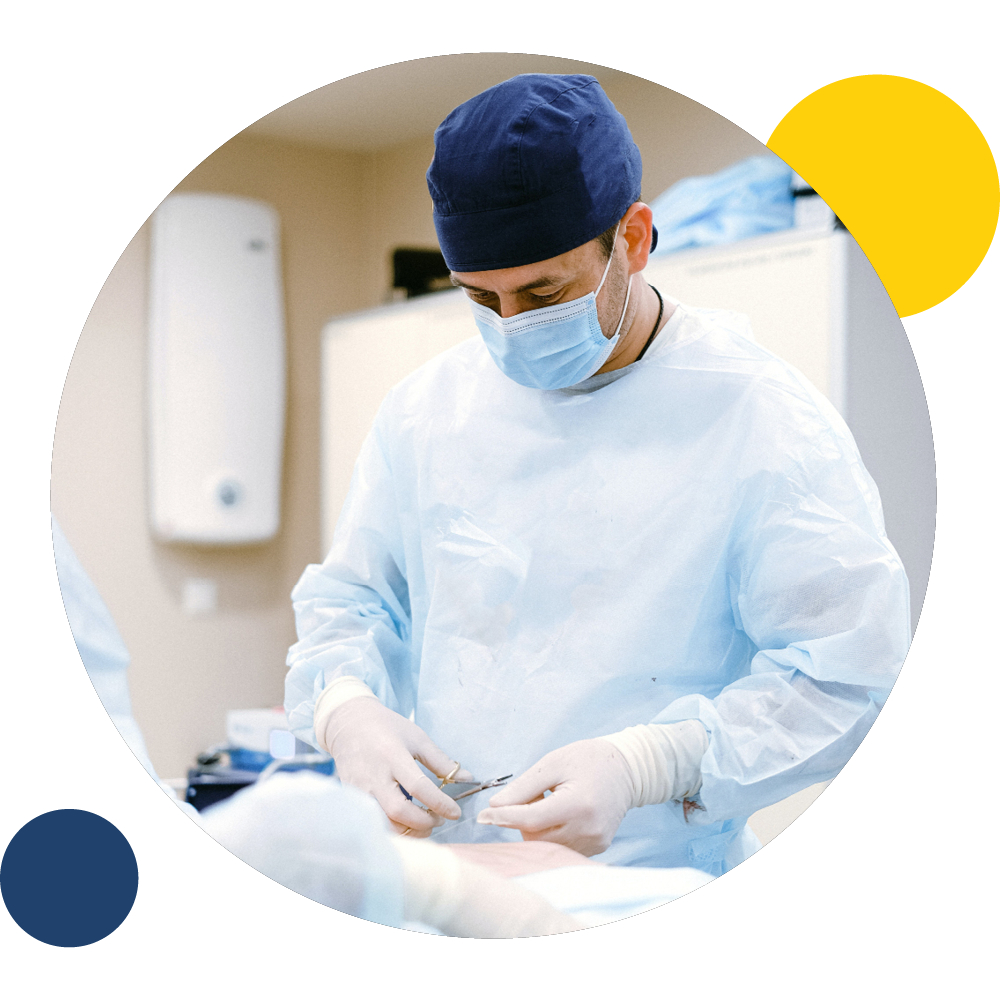
Let us help you evaluate your needs!
- Safety: Alerts to protect asset
- Compliance: Automated reports
- Efficiency: Reduced Manual Logging
And what makes us different?
- Lifetime Warranty: Never buy hardware again!
- Unlimited Users: Scale across your entire organization
- Connectivity Flexibility: Wi-Fi, Cellular or Data Hub
- Phone call alarms: Alerts won't get ignored
- Mobile App: 500 Freezers in your pocket
- Facility monitoring: Simple to add water leak, door open, occupancy and even IAQ monitoring
All American made and supported!
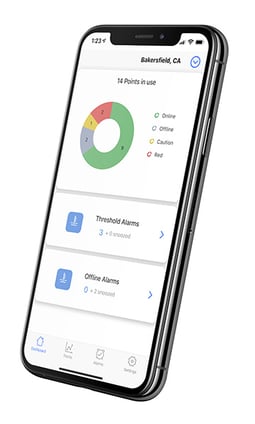
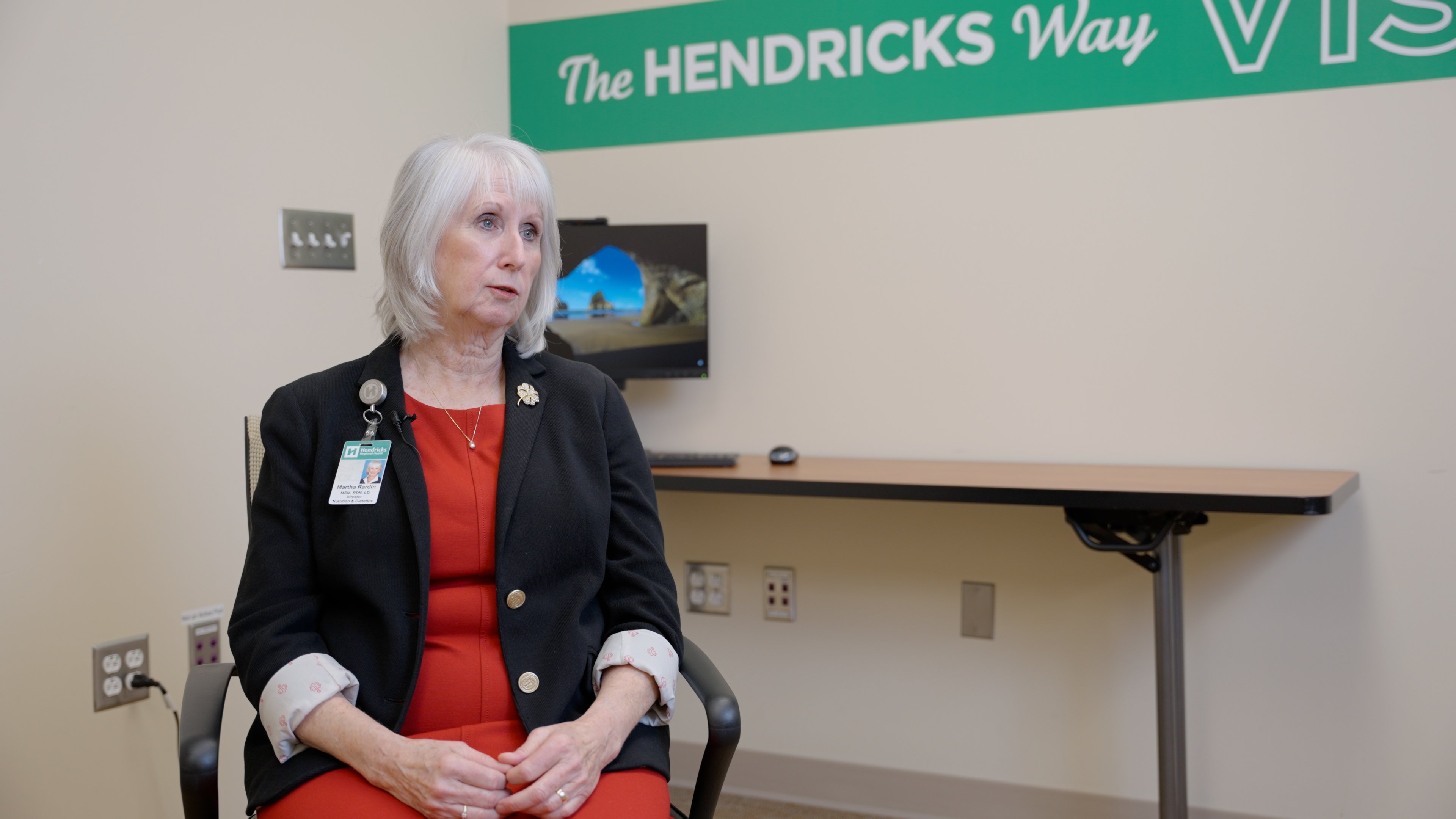
See What Customers Say About Sonicu
Asset Protection. Compliance Automation. And Reduced Manual Processes.
Sonicu serves thousands of professionals at hundreds of organizations across North America by improving how they monitor and manage their most sensitive assets and environments.
Professionals from healthcare, life science, laboratory and cold chain facility management turn to Sonicu to help them improve the way they do business.
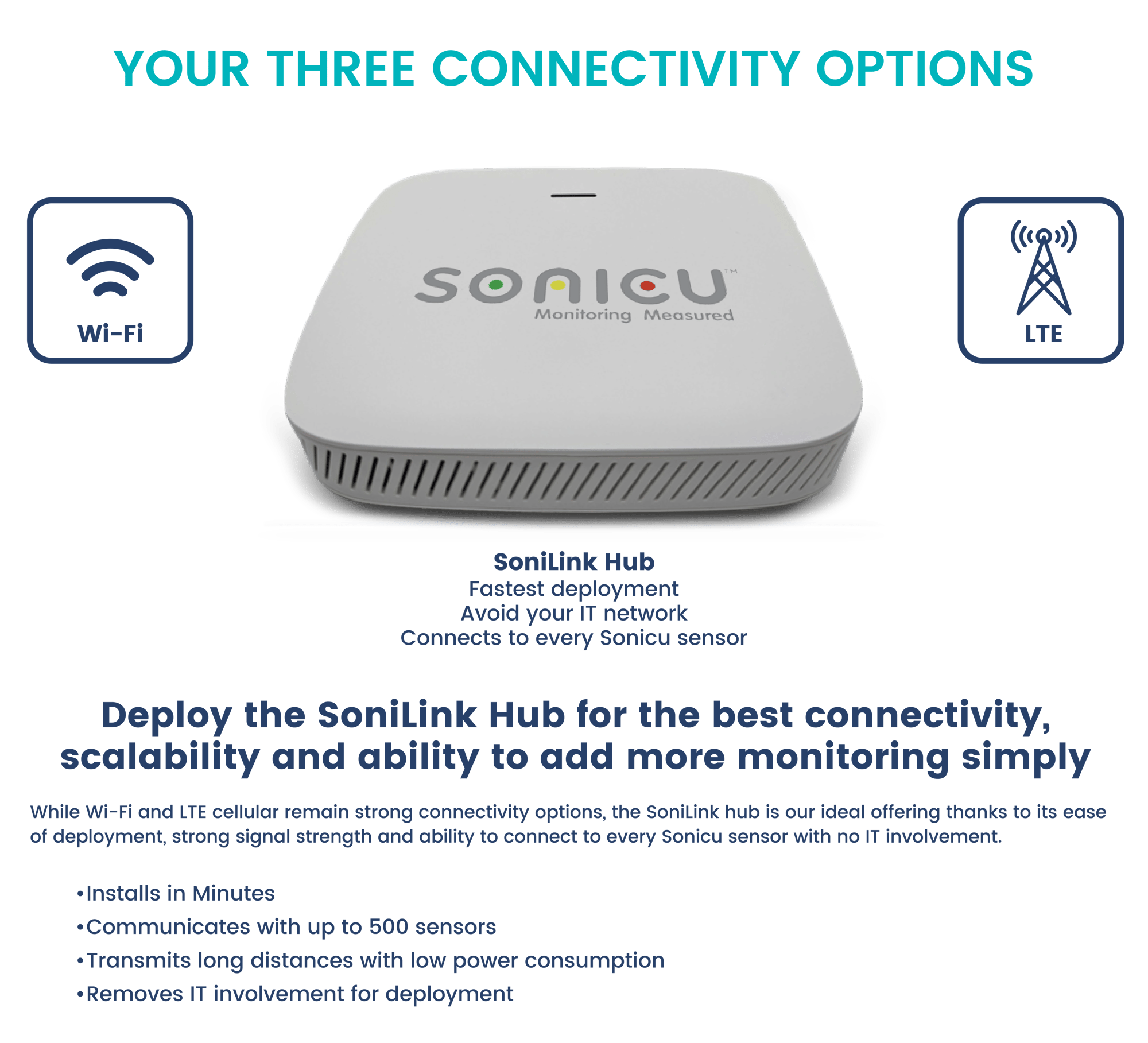
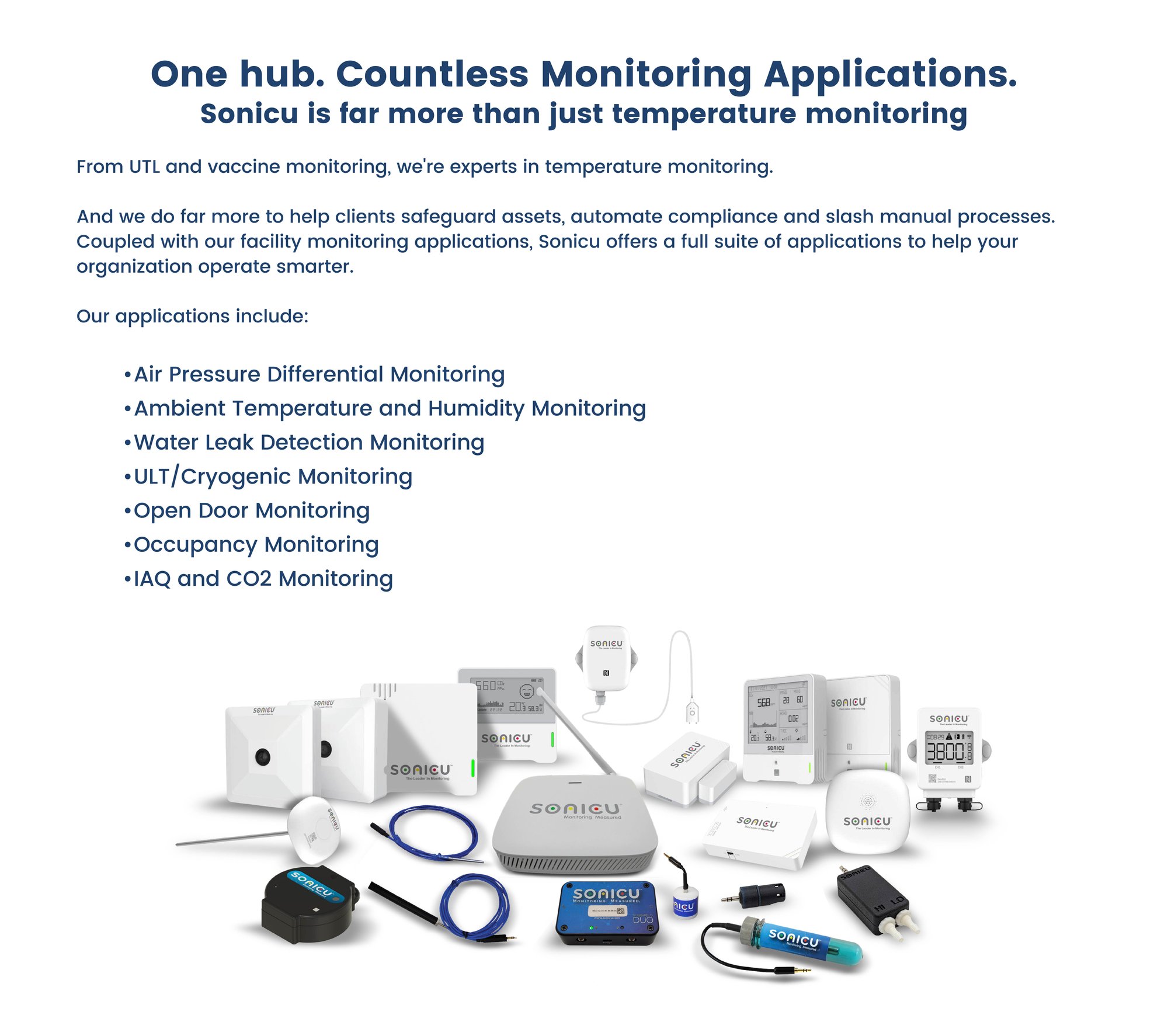
Commercial Freezer Temperature Alarm
Temperature monitoring devices are essential in several industries.
Products must remain at a consistent temperature during storage and transit to ensure their viability and the safety of consumers.
There are many different types of medical temperature monitoring systems.
Sonicu specializes in ULT, frozen, cold and room temperature monitoring solutions, particularly remote solutions.
Remote temperature monitoring systems allow devices and areas to be monitored digitally and off-site.
With Sonicu’s remote system, the temperature monitoring system reports are all stores in the cloud, allowing remote users to access data at any time.
This system can help ensure compliance and safety when dealing with sensitive products that must be temperature controlled.
Many businesses in the medical industry use temperature monitoring systems.
These industries include:
- Clinics surgery
- centers pharmacies
- cryogenic
- life sciences
- and many others
In a surgery center, for example, it is critical that the room remains at a stable temperature between 70 and 75 degrees Fahrenheit with a controlled humidity level.
This is to protect the patient and the surgery staff as the procedure is performed.
To create, maintain, and monitor these systems, healthcare industries must partner with organizations such as Sonicu to ensure that they are keeping their patients and staff safe in their environments.
Medical temperature monitoring systems are often made of several different devices to create an Internet of Things.
Each of these devices monitor different aspects of an environment. These devices report to one data logger, and are then uploaded into the cloud for system users to review.
Medical temperature monitoring devices should provide:
- A reliable sensor that monitors the temperature of the area
- A way for the temperature data to be communicated
- Constant reporting of the temperature data
- On-site and off-site monitoring displays
- Automatically generated reports for easy access to data
Many industries also monitor other environmental aspects such as sound, humidity and air pressure differential. Sonicu also offer the option to link any third-party sensor, including light detection, occupancy, door closure or even airflow through an HVAC filter, into the software monitoring via a third-party sensor and simple adapter kit.
Laboratory Temperature Monitoring System
Another primary usage of continuous temperature and humidity monitoring systems is in the laboratory or university life science research center.
Sonicu supports customers at various research institutions, including Harvard, Stanford, the University of Georgia and Auburn University.
Laboratories are often sterile environments that need to maintain very stable conditions.
A lab monitoring system helps ensure those conditions are met and maintained.
While the laboratory temperature and humidity standards can be different depending on location and industry, the FDA regulates that laboratories should be kept between 68 °F and 77 °F and with humidity levels between 30% and 50%.
Sonicu customer Tim Livesay, Pharmacy Director, Hancock Regional Hospital, leveraged his Sonicu system to detect a persistent humidity control issue.
Livesay was able to use the data from his ambient temperature and humidity monitoring system to protect the facility’s compounding pharmacy by prompting a climate control professional to fix an improperly sized air handling unit.
Using a laboratory temperature and humidity monitoring system is essential to maintain compliance with compliance-focused organizations, including a State Board of Pharmacy, the Joint Commission or federal agencies like the FDA, USDA or DEA.
Even with laboratories themselves, it may sometimes be necessary for certain freezers or containment units to have their own cooler temperature monitoring system.
In these cases, it can provide a double layer of protection around an asset in its environment. Laboratory freezer temperature monitoring and wireless refrigerant monitoring systems both have the potential to be remote and available for off-site monitoring, which can free laboratory personnel from having to take manual measurements.
Remote temperature and humidity monitoring systems can be accessed from anywhere, allowing laboratory personnel to focus on tasks other than manual temperature management.
The best remote monitoring solutions also offer automated reports and simple scaling opportunities.
You can learn more about how our software helps compliance professionals in these case studies:
Discount Drug Mart: Power Outage Protection + Compliance Automation
Problem: Transitioning from manual temperature logs and reactive power outage management
Solution: Adopting Sonicu's advanced system for seamless temperature monitoring and real-time power outage alerts across its 77 locations.
Hendricks Health: From Nutrition to the OR
Problem: The need to improve compliance and safety across various departments, starting from nutrition to the operating rooms.
Solution: Upgraded monitoring systems to enhance patient safety and streamline compliance across multiple facilities, including local YMCA rehabilitation facilities.
IU Health: Enterprise Monitoring
Problem: Challenges of using a locally based server and multiple monitoring solutions across departments.
Solution: Transitioned to a single, cloud-based solution with Sonicu to enhance monitoring capabilities across more than a dozen locations and the IU School of Medicine.
Continuous Body Temperature Monitoring Devices
Medical temperature monitoring isn’t just for rooms and environments.
This is also for monitoring individual body temperature. Continuous body temperature monitoring devices are units that are always measuring the temperature of the person wearing one.
The benefits of real time body temperature monitoring can include early fever detection which can be important in high-risk patients.
There are two different types of wireless body temperature monitoring systems: surface temperature and core temperature.
Non-invasive core temperature monitoring can be markedly more difficult and more expensive than measuring surface temperature.
Core temperature means measuring the temperature of your internal body, rather than your external body surface such as the skin.
While core temperature monitoring is most utilized inside healthcare facilities, there are also applications outside of a hospital setting.
For example, exercise and fertility are two areas where core temperature matters more than surface or peripheral temperature.
If you’re wondering how to measure core body temperature during exercise, there are products on the market that allow this to be done in a non-invasive manner.
This can also be done outside of a healthcare setting.
Body temperature monitoring watches typically only measure peripheral temperature, but are commonly used for exercise purposes.
In infants, continuous temperature monitoring baby devices also measure peripheral temperature and are used for peace of mind outside of hospital settings.
Temperature Monitoring System For Refrigerators
A refrigeration monitoring system is one of the most common usages of temperature monitoring.
Many industries use refrigeration to store or transport their product, including healthcare, food safety, pharmaceuticals, and others.
A temperature monitoring system for refrigerators often consists of sensors and meters to communicate that information with a display somewhere.
Even some in-home products these days utilize refrigerator temperature monitor wi-fi connectivity to communicate the internal temp of your fridge straight to your phone.
Commercial refrigerator temperature monitoring systems are often monitoring a larger area with more product capacity. However, both of these systems can be remote fridge temperature monitoring solutions.
The in-home fridge that communicates its temperature to your phone is a remote solution.
A commercial refrigerator, or walk-in cooler temperature monitoring system may have more sensors but will ultimately report wirelessly and remotely in the same way that an in-home fridge can.
These sensors can communicate with meters to report wirelessly and also have an on-site digital display.
Commercial freezer temperature monitoring systems are nearly identical to those for refrigeration.
Temperature monitoring units should be fairly standard, no matter what environment they are set to monitor. Freezer temperature monitors are also used to protect assets and ensure regulatory compliance.
Hospital Refrigerator Temperature Monitoring System
Sonicu takes an “internet of things” approach to a temperature and humidity monitoring system using arduino-like programming.
This means that devices that wouldn’t normally be able to communicate with each other, like a temperature sensor and cloud-based software, are now able to send and receive signals with each other.
The Sonicu temperature monitoring kit includes the SoniShield Duo, a sensor, a cable, a power adaptor, and a live monitoring display on your PC, tablet, or smartphone.
The kit is able to do this thanks to the internet of things.
Industrial temperature monitoring systems often have a lot of external regulations and requirements.
Hospital refrigerator temperature monitoring systems are no exception. Utilizing a wireless solution can aid in asset protection, ensure compliance, and free personnel from taking manual measurements.
This can lead to increased ROI as personnel can now complete tasks requiring more complex thought and a human touch.
You can learn more about how our software helps compliance professionals in these case studies:
Xytex Sperm Bank: Ultra Low Temperature Monitoring
Problem: Frequent false alerts were causing alarm fatigue, threatening the operations at Xytex Sperm Bank.
Solution: Partnered with Sonicu to develop a custom temperature monitoring solution for ULT and cryo temperatures, including probes inside and outside the preservation chambers.
Boy Scouts: Protecting Campers from a Temperamental Walk-in Cooler
Problem: An aging walk-in cooler failed at a remote campground in Ohio, causing significant food loss and logistical challenges for the Boy Scouts.
Solution: Sonicu provided a system that was easy to install, connected with a mobile app, affordable for a non-profit budget, and automated the required manual logging.
Hamilton County, Indiana Health Department: Vaccine Monitoring
Problem: The need to protect vaccines from temperature excursions and meet state compliance requirements with an outdated analog system.
Solution: Implemented a new monitoring system with a mobile app and robust support, enhancing the management of remote COVID-19 vaccination programs.
American-based Customer Support: Robust & Reliable High Touch Service
Software and technology is only as good as the people who stand behind it.
At Sonicu, that means our team of American-based customer success managers who are never more than a phone call away to help field and fix any service issues.
Our probes and sensors are placed in demanding frozen environments and our software literally sends billions bits of data monthly, meaning there’s alway the potential for a hiccup on either the hardware or software.
We are committed to fielding every customer service request promptly and addressing our customer’s concerns promptly and professionally.
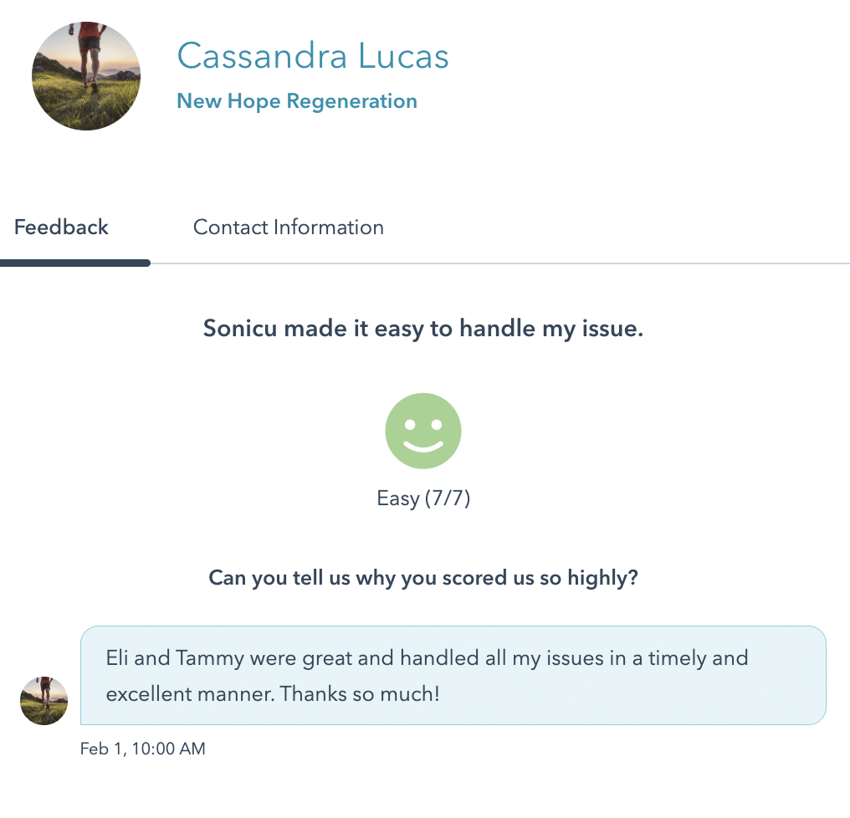
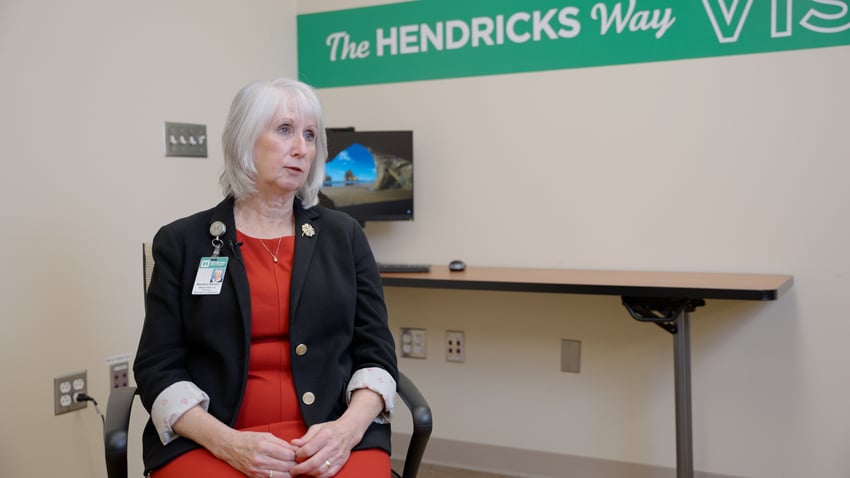 “I like to say that every refrigerator or freezer is like a car in that they all behave a bit differently,
“I like to say that every refrigerator or freezer is like a car in that they all behave a bit differently,
and then every now and then you just get a bad boy who doesn’t want to perform as we need it to,”
Martha Rardin, Director, Nutrition and Dietetics, Hendricks Regional Hospital.
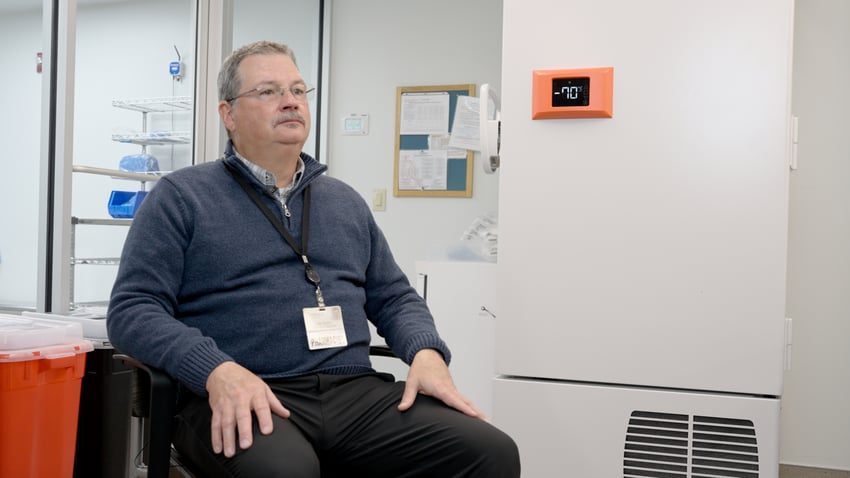 “Sonicu has been a powerful tool to identify which units are behaving out of spec and get our team
“Sonicu has been a powerful tool to identify which units are behaving out of spec and get our team
to fix them before we have a serious issue.”
Tim Livesay, Director, Hancock Regional Hospital Pharmacy Director

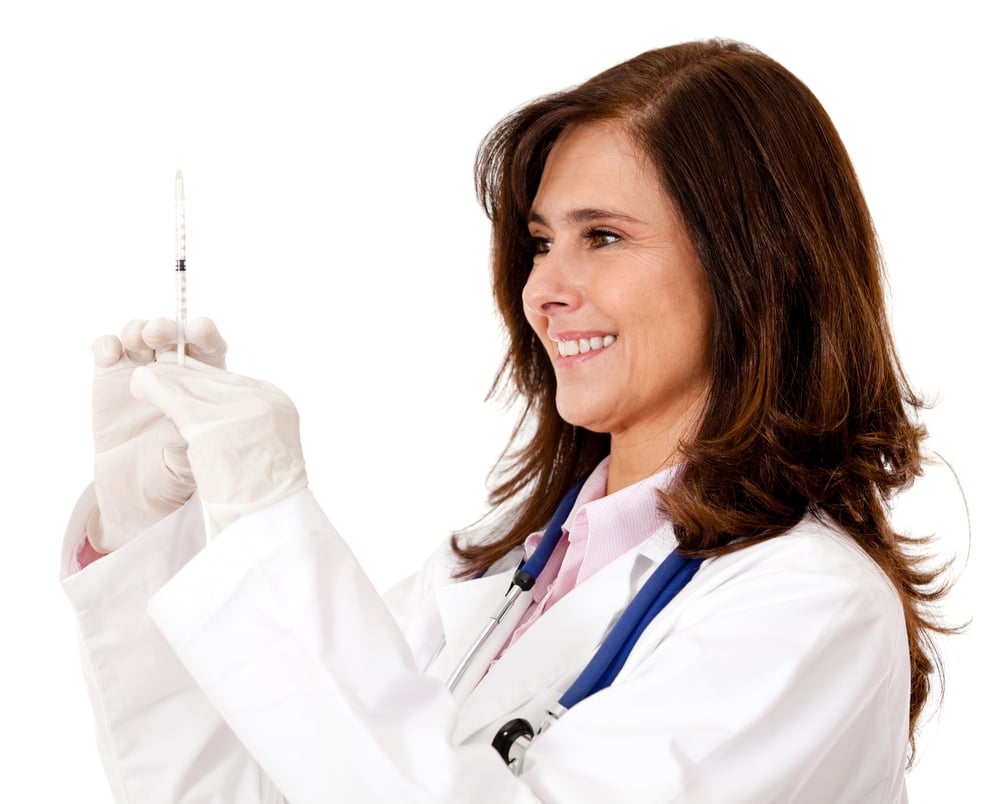
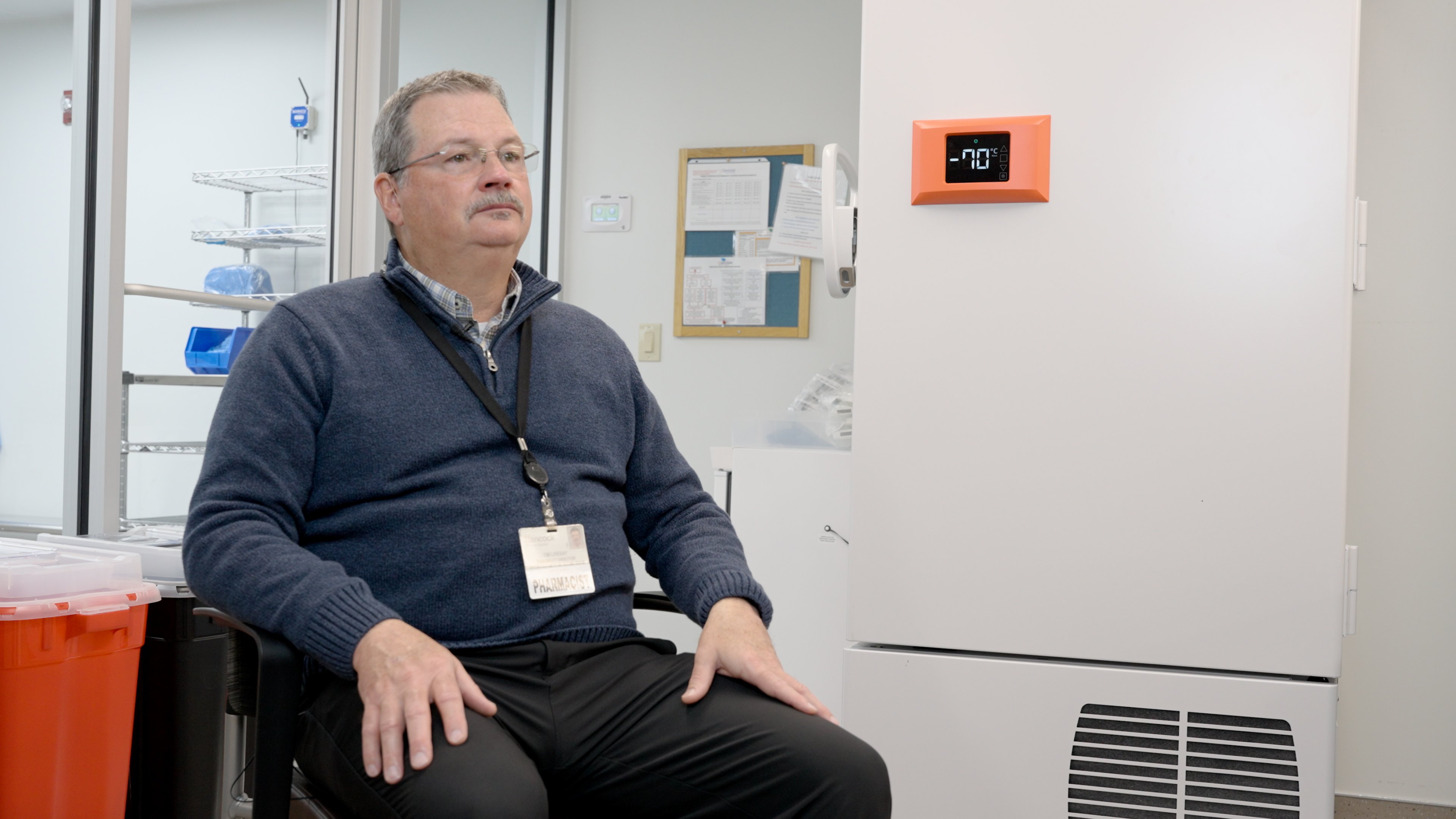
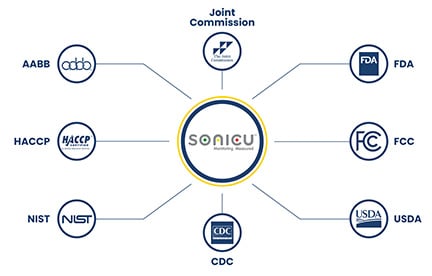
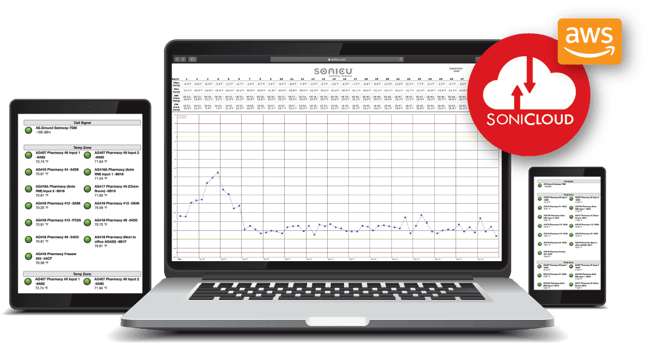


We realized there had to be a better way and went in search of technology that could give us that level of monitoring that would keep our patients safe. Sonicu made it easy and we grew across the entire hospital.